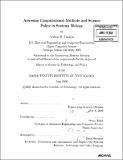| dc.contributor.advisor | Bruce Tidor. | en_US |
| dc.contributor.author | Castillo, Andrea R. (Andrea Redwing) | en_US |
| dc.contributor.other | Massachusetts Institute of Technology. Technology and Policy Program. | en_US |
| dc.date.accessioned | 2010-02-09T16:57:18Z | |
| dc.date.available | 2010-02-09T16:57:18Z | |
| dc.date.copyright | 2009 | en_US |
| dc.date.issued | 2009 | en_US |
| dc.identifier.uri | http://hdl.handle.net/1721.1/51655 | |
| dc.description | Thesis (S.M. in Technology and Policy)--Massachusetts Institute of Technology, Engineering Systems Division, Technology and Policy Program, 2009. | en_US |
| dc.description | Includes bibliographical references (p. 109-112). | en_US |
| dc.description.abstract | In this thesis, I discuss the development of systems biology and issues in the progression of this science discipline. Traditional molecular biology has been driven by reductionism with the belief that breaking down a biological system into the fundamental biomolecular components will elucidate such phenomena. We have reached limitations with this approach due to the complex and dynamical nature of life and our inability to intuit biological behavior from a modular perspective [37]. Mathematical modeling has been integral to current system biology endeavors since detailed analysis would be invasive if performed on humans experimentally or in clinical trials [17]. The interspecies commonalities in systemic properties and molecular mechanisms suggests that certain behaviors transcend specie differentiation and therefore easily lend to generalizing from simpler organisms to more complex organisms such as humans [7, 17]. Current methodologies in mathematical modeling and analysis have been diverse and numerous, with no standardization to progress the discipline in a collaborative manner. Without collaboration during this formative period, successful development and application of systems biology for societal welfare may be at risk. Furthermore, such collaboration has to be standardized in a fundamental approach to discover generic principles, in the manner of preceding long-standing science disciplines. This study effectively implements and analyzes a mathematical model of a three-protein biochemical network, the Synechococcus elongatus circadian clock. | en_US |
| dc.description.abstract | (cont.) I use mass action theory expressed in kronecker products to exploit the ability to apply numerical methods-including sensitivity analysis via boundary value formulation (BVP) and trapiezoidal integration rule-and experimental techniques-including partial reaction fitting and enzyme-driven activations-when mathematically modeling large-scale biochemical networks. Amidst other applicable methodologies, my approach is grounded in the law of mass action because it is based in experimental data and biomolecular mechanistic properties, yet provides predictive power in the complete delineation of the biological system dynamics for all future time points. The results of my research demonstrate the holistic approach that mass action method-ologies have in determining emergent properties of biological systems. I further stress the necessity to enforce collaboration and standardization in future policymaking, with reconsiderations on current stakeholder incentive to redirect academia and industry focus from new molecular entities to interests in holistic understanding of the complexities and dynamics of life entities. Such redirection away from reductionism could further progress basic and applied scientific research to embetter our circumstances through new treatments and preventive measures for health, and development of new strains and disease control in agriculture and ecology [13]. | en_US |
| dc.description.statementofresponsibility | by Andrea R. Castillo. | en_US |
| dc.format.extent | 112 p. | en_US |
| dc.language.iso | eng | en_US |
| dc.publisher | Massachusetts Institute of Technology | en_US |
| dc.rights | M.I.T. theses are protected by
copyright. They may be viewed from this source for any purpose, but
reproduction or distribution in any format is prohibited without written
permission. See provided URL for inquiries about permission. | en_US |
| dc.rights.uri | http://dspace.mit.edu/handle/1721.1/7582 | en_US |
| dc.subject | Engineering Systems Division. | en_US |
| dc.subject | Technology and Policy Program. | en_US |
| dc.title | Assessing computational methods and science policy in systems biology | en_US |
| dc.type | Thesis | en_US |
| dc.description.degree | S.M.in Technology and Policy | en_US |
| dc.contributor.department | Massachusetts Institute of Technology. Engineering Systems Division | |
| dc.contributor.department | Technology and Policy Program | |
| dc.identifier.oclc | 501188223 | en_US |
